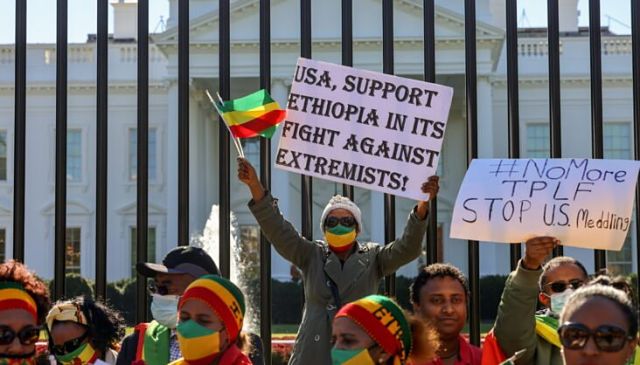 Although misinformation in foreign press is still abundant, following the string of victories against TPLF in the past few days it appears that some Western media outlets are trying to adjust their unbalanced coverage of the situation in Ethiopia (See below an excerpt of AFP's latest news explainer). Meanwhile, the Biden administration says its shelving its dangerous 'genocide' PR scheme against the country as its runaway policy is receiving much-needed congressional criticism and oversight. (Photo: Ethiopians protest in DC/Reuters)
Although misinformation in foreign press is still abundant, following the string of victories against TPLF in the past few days it appears that some Western media outlets are trying to adjust their unbalanced coverage of the situation in Ethiopia (See below an excerpt of AFP's latest news explainer). Meanwhile, the Biden administration says its shelving its dangerous 'genocide' PR scheme against the country as its runaway policy is receiving much-needed congressional criticism and oversight. (Photo: Ethiopians protest in DC/Reuters)
AFP
Ethiopia’s military this week regained control of territory previously claimed by [TPLF] rebels, a potential validation of Prime Minister Abiy Ahmed’s decision to join soldiers to conflict-hit areas…
Just a month ago, the Tigray People’s Liberation Front (TPLF) rebel group appeared to be on the offensive, claiming to have captured Dessie and Kombolcha, towns on a key highway headed towards the capital Addis Ababa.
They reportedly reached as far as Shewa Robit, around 220 kilometres (135 miles) northeast of Addis Ababa by road.
But after Abiy announced last week he would lead operations in the field, the government announced a string of victories and the rebels acknowledged making adjustments to their strategy.
State media has responded with triumphalist wall-to-wall coverage.
There’s little doubt the government can claim to have the “upper hand” in specific areas, said Awet Weldemichael, a Horn of Africa security expert at Queen’s University in Canada…
- A surprise shift -
All the while, though, the exact nature of the TPLF advance was in dispute.
“I don’t know whether we should call it an advance,” one Western security official told AFP in mid-November.
“There’s not a huge column of tanks and armoured vehicles driving down the road towards Addis. It’s more complex than that. There are foot soldiers going into the mountains, they shoot and surround certain areas” but do not seem to fully control cities and towns, the official said.
The latest battlefield shifts unfolded swiftly.
The government first claimed towns in Afar, near a critical highway bringing goods to Addis Ababa, then on Wednesday it declared victory in Lalibela, a UNESCO World Heritage site that fell to the TPLF in August.
On Friday state media announced that towns on the road heading north towards Dessie and Kombolcha had been “liberated”.
The news could be a sign that government forces, as well as many thousands of new recruits who have enlisted in recent months, have more fight than they’ve gotten credit for.
“I was quite surprised by the latest counteroffensive by the government,” said Mehdi Labzae, a sociologist who studies land issues and mobilisation in Ethiopia.
“I have seen all the people who were mobilised… but the thing is I thought they were not trained and I thought they would just be destroyed.”
The path ahead
The African Union is trying to broker a ceasefire to avert further bloodshed, though there has been little progress so far.
The TPLF insists it will have the advantage in whatever fighting is to come…
One possibility, said Awet of Queen’s University, is that the government’s superior air power has turned the tide — at least for now.
“Drones are claimed to have played a decisive role in active combat, the full extent of which we are yet to find out,” he said.
“But so far, it appears like they have helped halt [TPLF] counterattacks and advances.”
Click here to read the full article »
—
Related:
Watch: PM Abiy’s press secretary Billene Seyoum on Fox News
US policies on Ethiopia, Nigeria, and Covid in Africa come under fire in Congress
UPDATE: Ethiopia Recaptures World Heritage Site Lalibela From TPLF
US halts decision on genocide designation to pursue diplomacy in Ethiopia
Ethiopia to U.S.: Stop Misinformation
Announcement by Olympic Legends Haile & Feyisa Capture Ethiopia’s Mood
In Diaspora protestors call out Joe Biden’s foreign policy in Ethiopia
Ethiopia Struggles to Find Its Voice in Western Media Amid Misinformation
Yale hosts Ethiopia conference amid social media controversy, disinvites speaker
BUSINESS: Forbes on Why Team Biden Shouldn’t Mess With US-Ethiopia Trade
In Africa, America’s Hysterical Western Media Driven Ethiopia Policy Reaches Dead End
What’s Wrong With Blinken? Goes to Africa to Talk Ethiopia, But Skips Addis & AU?
In U.S Ethiopian American Voters Send Biden a Message, Flipping Virginia Red
Join the conversation on Twitter and Facebook.

























